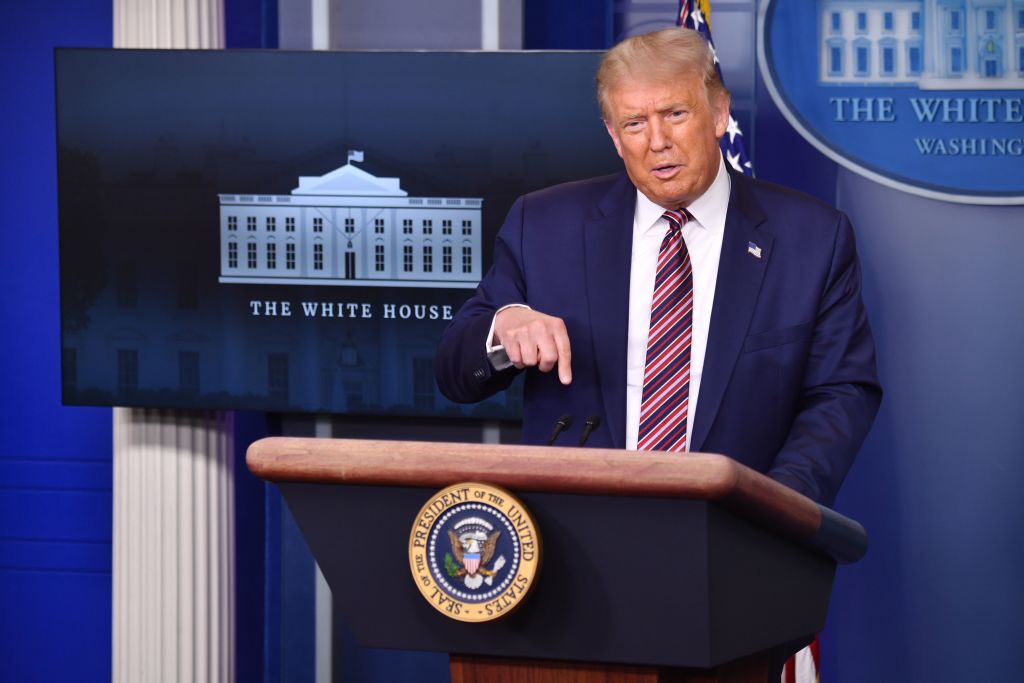Trump's payroll tax deferral is confusing, maybe unworkable, top U.S. business group warns


A free daily email with the biggest news stories of the day – and the best features from TheWeek.com
You are now subscribed
Your newsletter sign-up was successful
President Trump has been notably vague about his plans for a potential second term, but he has recently proffered one idea: tax cuts. Specifically, taxes on capital gains, income taxes, and the payroll taxes used to fund Social Security and Medicare. Trump signed an executive order Sunday directing the Treasury Department to defer payroll taxes from Sept. 1 until the end of the year, leaving workers to pay the money back later.
The U.S. Chamber of Commerce, generally a Trump ally on tax cuts, has some serious concerns.
Trump has pitched the payroll tax deferral as a boost to the economy before the November election, but the Chamber asked Treasury Secretary Steven Mnuchin in a letter Wednesday if it would be optional, whether businesses will be liable for repaying the deferred taxes, and how the White House expects the deferred withholdings to help the economy. Trump's order is "surrounded by uncertainty as to its application and implementation" and "only exacerbates the challenges" companies face, the Chamber said. "As American employers, workers, and families work to navigate the COVID-19 crisis they need clarity not more confusion," the business group added in a statement.
The Week
Escape your echo chamber. Get the facts behind the news, plus analysis from multiple perspectives.

Sign up for The Week's Free Newsletters
From our morning news briefing to a weekly Good News Newsletter, get the best of The Week delivered directly to your inbox.
From our morning news briefing to a weekly Good News Newsletter, get the best of The Week delivered directly to your inbox.
Trump touted his executive order in a news conference Wednesday evening, saying he would make the payroll tax holiday permanent if re-elected — something that would require an act of Congress, where there is little appetite for the idea in either party. Asked how he planned to finance Social Security and Medicare without the payroll tax, Trump suggested "we're taking it out of the general fund" and then claimed it wouldn't further blow up the ballooning budget deficit because "we're going to have tremendous growth."
Trump issued the payroll tax order and other executive actions rather than reaching a deal with congressional Democrats on a new bill to shore up the coronavirus-addled economy and individual Americans. Negotiations resumed Wednesday and then quickly died, each side blaming the other.
Meanwhile, "Trump's advisers have sought legal guidance from White House lawyers about whether the president has the authority to eliminate certain taxes, including income and business taxes, without the approval of Congress," The New York Times reports. "The legality of such a move is dubious," because the Constitution gives Congress the sole power to set tax policy, but "the executive branch does have wide latitude" regarding tax collection, and "Trump has not been shy about pushing the boundaries of his authority."
A free daily email with the biggest news stories of the day – and the best features from TheWeek.com
Peter has worked as a news and culture writer and editor at The Week since the site's launch in 2008. He covers politics, world affairs, religion and cultural currents. His journalism career began as a copy editor at a financial newswire and has included editorial positions at The New York Times Magazine, Facts on File, and Oregon State University.
-
 Palantir's growing influence in the British state
Palantir's growing influence in the British stateThe Explainer Despite winning a £240m MoD contract, the tech company’s links to Peter Mandelson and the UK’s over-reliance on US tech have caused widespread concern
-
 Quiz of The Week: 7 – 13 February
Quiz of The Week: 7 – 13 FebruaryQuiz Have you been paying attention to The Week’s news?
-
 Nordic combined: the Winter Olympics sport that bars women
Nordic combined: the Winter Olympics sport that bars womenIn The Spotlight Female athletes excluded from participation in demanding double-discipline events at Milano-Cortina
-
 TikTok secures deal to remain in US
TikTok secures deal to remain in USSpeed Read ByteDance will form a US version of the popular video-sharing platform
-
 Unemployment rate ticks up amid fall job losses
Unemployment rate ticks up amid fall job lossesSpeed Read Data released by the Commerce Department indicates ‘one of the weakest American labor markets in years’
-
 US mints final penny after 232-year run
US mints final penny after 232-year runSpeed Read Production of the one-cent coin has ended
-
 Warner Bros. explores sale amid Paramount bids
Warner Bros. explores sale amid Paramount bidsSpeed Read The media giant, home to HBO and DC Studios, has received interest from multiple buying parties
-
 Gold tops $4K per ounce, signaling financial unease
Gold tops $4K per ounce, signaling financial uneaseSpeed Read Investors are worried about President Donald Trump’s trade war
-
 Electronic Arts to go private in record $55B deal
Electronic Arts to go private in record $55B dealspeed read The video game giant is behind ‘The Sims’ and ‘Madden NFL’
-
 New York court tosses Trump's $500M fraud fine
New York court tosses Trump's $500M fraud fineSpeed Read A divided appeals court threw out a hefty penalty against President Trump for fraudulently inflating his wealth
-
 Trump said to seek government stake in Intel
Trump said to seek government stake in IntelSpeed Read The president and Intel CEO Lip-Bu Tan reportedly discussed the proposal at a recent meeting
